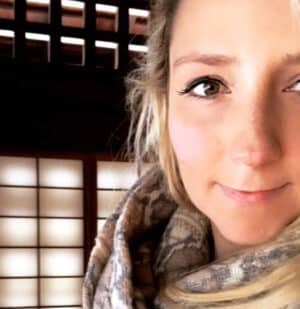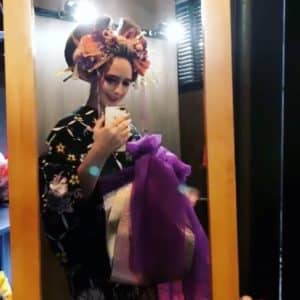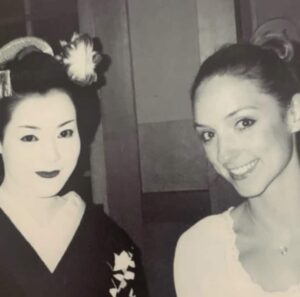
*Warning: Your Japanese teacher won’t like my suggestions*
“How to learn to speak Japanese quickly?” Is something that I ponder often and what I do know is what I would do now if I was starting over.
I started studying Japanese at the start of high school. I began with the good-old basics of self-intros and then slowly, slowly moving on to hiragana, katakana and then ,a few years later, graduated to kanji. But I was 12 then and wasn’t in a hurry to start conversational Japanese then. I wouldn’t have had anyone to put it into practice with, actually, if I had been able to chat away right at the start.
PLEASE NOTE: This article contains some affiliate links. If you purchase something through one of these links, I will receive a small commission at no additional cost to you.
But if that beginner was me now? …all grown up me now and I was trying to just get that communication element happening as soon as possible? I would do things completely differently – and I think that there are short-cuts. Especially if you’re already here – because your “classroom” is, obviously, everywhere.
I know because I’ve seen the really clever friends that have moved to Japan for only a year or two… taken the shortcuts …and they were proper little nihongo chatterboxes by the time they left.
My Japanese language studies will never be finished (actually, neither will my English language studies!) but I think the “starting to talk” part isn’t as bad as people fear. It’s not an impossible mountain to climb – just several teeny, weeny little steps one after the other.
Here are some suggestions that, I think, will help conversing in Japanese less daunting:
Forget all of the writing and the reading
Yeah….so …. all the language senseis right now are hating me for saying this…but it’s something I really believe in if you want to start speaking Japanese as soon as possible. Then, once you’re out in the world chatting away – you can start the reading and writing part.
When I started high school (called junior high in other parts of the world), we were given 2 years of compulsory language study and my school offered Japanese and French. I, obviously, went with the first option and – as you’ve guessed- I have no regrets for a moment…BUT I do remember being completely and utterly seething with envy at my friends who had chosen French.
Once their compulsory 2 year stint was up, they were writing letters to French penpals (remember penpals ?!! ha!) , making little jokes amongst themselves and watching glamorously moody movies.
And there was me ….working my nerdy bottom off…sitting in the corner saying “konnichiwa” and “hambaagaaa o tabemashita” (I ate a hamburger.)
I really do believe that much of the process of the conversing was slowed down, considerably, by starting with the reading and writing basics at the same time as all of the talking. When you learn Japanese it’s a thorough and steady process (completely worth it, by the way, but not the quickest way to learn if you want to start chatting.)
A fantastic instagram account to follow for “ready to use” phrases is @miku_real_japanese
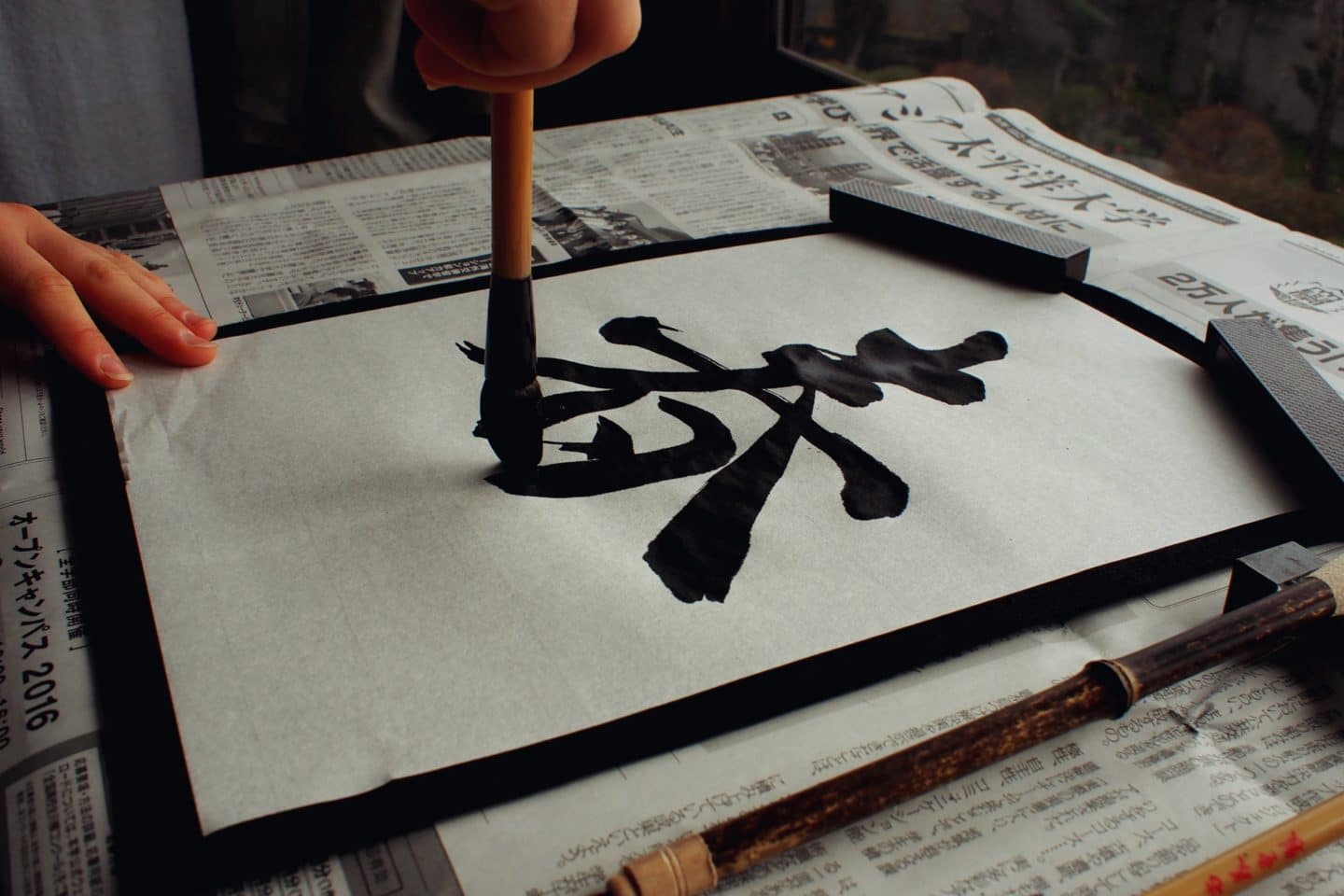
Forget those basics that you think you should probably learn first
Right. So you sit down with a text book or in a class and you’ll probably start with the “My name is….” “I’m ….years old.” “I like…..” deal.
I hate to break it to you but even a Japanese person who slept through all of their English classes knows how to understand that part in English… So skip those pages….. ! Skip ! Keep turning.
If you’re in a rush to start all of the talking and the listening …. probably skip the money amount part too….people in shops can almost always say the amount or it’s on the register display OR they can write it down and you’ll get the idea!!
Put your energy ( and memory power) elsewhere.
Press “mute” on the negativity
You can google around everywhere and talk to anyone about acquiring fluency in Japanese and they’ll tell you it’s a long road ahead. It’s true, if you want to be completely fluent….. it truly is (and kind of should be) a full time job. I still do a 1.5 hour class every week. So…… if there was a magic little “Japanese language pill” out there….I would have tried to take it already (and the jury is out on whether or not I’d be comfortable sharing that baby around! ….. hmmm)
The people who truly know me know how much it “urk’s” me when another visitor to Japan says “You’re so lucky that you speak Japanese.” (Insert head explosion here. I’ve worked hard for that, buddy!)
I used to always have my eye out for articles on “Japanese language hacks” but there was always one yukky theme – something along the lines of “It’s way too difficult a language… it will take you forever so don’t bother if you don’t have a whole lifetime to devote…” blah blah blah.
It’s rubbish and I don’t think it’s true.
A lot of people who have studied hard to become fluent like to tell that tale too – makes them feel extra brainy, you see. If you want to be a professor maybe ? Then yes – life dedication is a requirement. Do you want to order a round of drinks for your friends though? Ask if you can park your bike here? You’re probably going to be okay…..
Want to know what is a hard language ? ENGLISH!!!
Don’t even get me started! There are lots of different kinds of English and there are exceptions to grammatical rules here there and everywhere !!!!!! Seriously!! The way that words are spelled and pronounced rarely correlate .. and think about how some letters placed on the end of words affect the sounds of other letters? ….like the word “man” …and then you add another letter to the end to make “many” and the “a” sound changes completely. Explain that to an English-as-a-second-language student?!! (actually, explain that to me??!!haha)
So…don’t let anyone talk to you about Japanese being the hardest language ever. There are lots of not-so-tricky elements to studying Japanese.
Example one: Japanese is phonetic. There is no silent “e” at the end or secret “ph” = “f” sound. If the word is written in romaji (romanized characters) and says “Kimono” that means “Ki-mo-no.” Something to keep in mind when you’re trying to pronounce station and place names. Try not to make vowels sounds longer than they need to be.
Example two: Katakana words are very easy to understand as they are ALMOST always borrowed from English. Katakana words are particularly useful if you’re out at a restaurant that serves western food (or a Starbucks etc.) you’ll hear words like “orenji jyu-su” (orange juice) or “ko-n su-pu” (corn soup.)
Example three: Did you know that casual Japanese often doesn’t require a subject or object in the sentence if the meaning is already clear in the context? When many people start speaking Japanese they say “Watashi wa…..” (“I” or “I am”) because that’s how we would start a sentence in English. e.g. “I like pink.” But if you say it in Japanese, you don’t need to say the “I” part. Just “Pinku ga suki ” so the word for pink (pinku) plus “ga suki” (the sentence particle “ga” + the word for like “suki” ).
Example four: There are no feminine and masculine nouns like there are for the romance languages.
Example five: The Japanese sentence order is actually really handy when you’re starting out. A very basic sentence is pretty much in the reverse order to English. For example in English you’d say “I want to go to the station” but in Japanese the order is reverse “Eki ni ikitai.” Eki is station. Ni is the particle so your equivalent, in this case, of saying “to”. Ikitai is “want to go.” So the main point of where you want to get to first is out there right at the start. If you get the Eki part then maybe the Ni and struggle to get out the next bit…? Your taxi driver is already getting the idea! (Just an FYI, if you want to go to a specific station, put that station name at the very start. Tokyo Eki = Tokyo Station.)
Example six (last one, promise): Plurals don’t hold the same value when ordering food or buying items as they do in English. You only need to actually use counters if you’re ordering more than one of something. So if it’s just one cheeseburger. You can just say “cheezubaagaa kudasai” (cheeseburger please.) No need to say “One cheeseburger please”
Choose an area or genre to start with and go crazy on the vocab and a few sentences
If you’re starting out and just need to get talking why not master one single topic of discussion and completely nail it?
No matter what your scenario is, for basic conversations (at least at the start), you will mostly get the same questions over and over, need to ask similar questions ….or need to make similar kinds of greetings every time.
I was able to ‘fake it’ when I was a high school student in rural Japan as I found that everyone almost always asked me the same questions at the beginning of a conversation. Where was I from ? How long had I been here? How much longer would I be here? Am I homesick? Where in Australia are you from? etc… So I got really, really good at those questions. And suddenly, for a short chat with my friend’s mum or the lady at the post office, I certainly looked and sounded very fluent….then I got more confident and started to ask questions back…answer more difficult questions and so on….blah blah blah.
So, for example …if you are a real foodie and love dining out…why not become an ‘ordering food in a restaurant’ vocab guru? Or a new mum with a baby who mostly talks to people at playcentres and the park ? You may want to brush up on the words related to all things nappies, breastfeeding and talking about how old your baby is.
Once you’re in Japan, you may surprise yourself with what topics you may need to learn. Maybe all of the taxi Japanese ? Starbucks Japanese? Directions or train related Japanese?
In the same light, study the topics you enjoy. I’m much more likely to work harder at understanding a show or conversation about a delicious-looking recipe or something to do with my children. But I can bet you that I wouldn’t put in half as much effort if it was about cars or a Financial Times article.
Speaking in sentences is all about confidence in a small area and then you’ll feel so good that you’ll want to try more and more words. (Probably why everyone feels like they’re that bit closer to being bilingual after a few drinks right?)
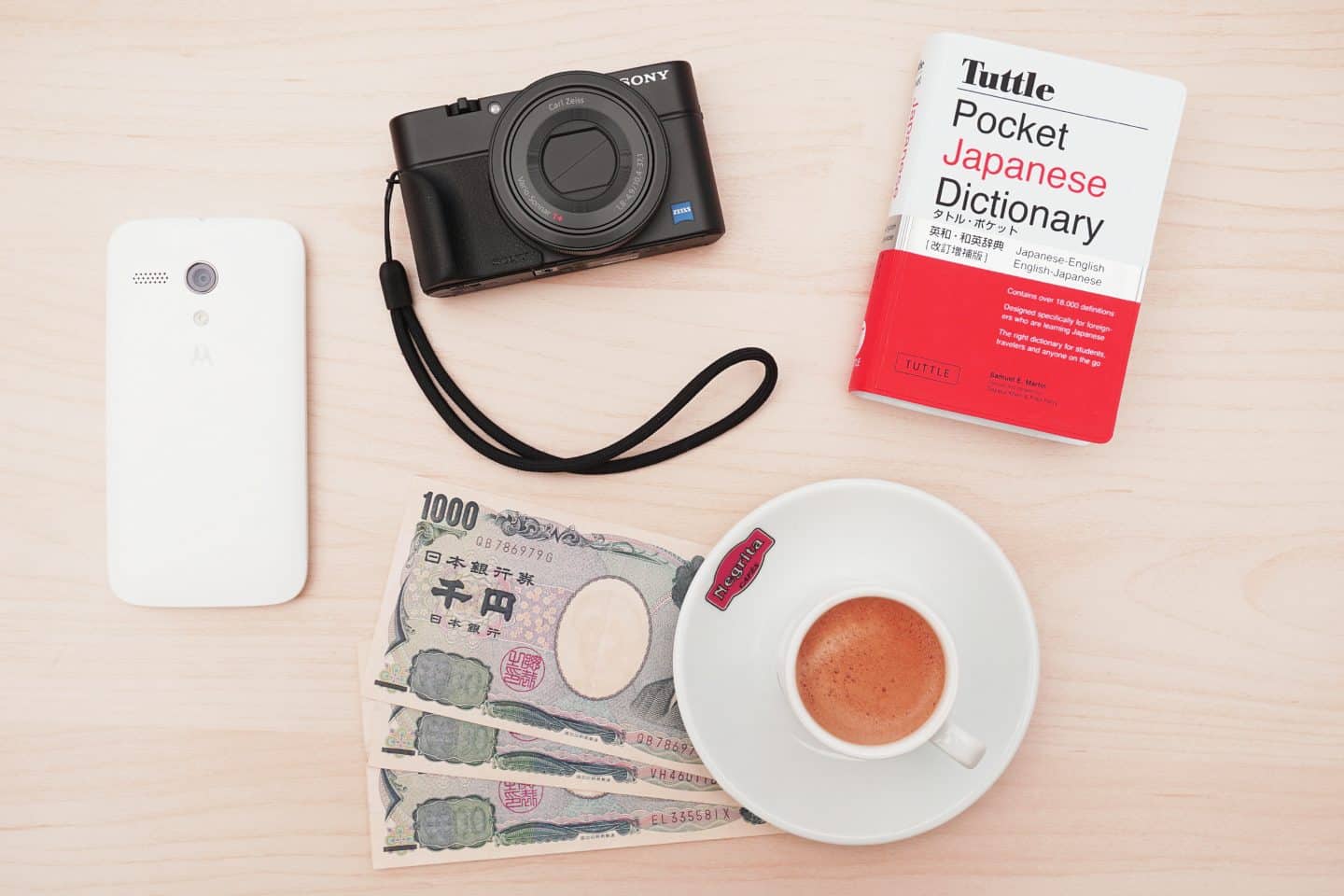
Carry a small notepad everywhere
I have a little, old casio electronic dictionary that I used to carry everywhere (but not just use at home) with a ‘saved history’ button and then I went to a notepad or just made little notes on my phone….but I write down the new words that I have overheard or the scenarios that didn’t go well so I can practice and look them up again when I get home… and make it better for next time. This is my best way of taking part in practical and almost immediate revision. I can learn from my own mistakes and see right in front of me where the “gaps” are.
Pretend you’re advising someone else
If you were at home and had a new English speaker ask you for advice on how to get by at the beginner level ….let’s say…they had a job in a restaurant or something…. how would advise that they get enough English to get by almost right away?
I’m guessing you wouldn’t hand them a copy of MacBeth or even worksheets on the alphabet, yes?

I’m assuming you’d suggest some restaurant vocab practice and some made up scenes for role-playing instead, right?
Give yourself some advice. I’ll bet it’s more simple than you originally imagined.
Don’t be a d*&#@khead and try and talk like one
Did you ever see the 90s movie ‘Can’t Hardly Wait”? (If you haven’t, you should …it’s 90s teen movie-licious) …and there is the exchange student who everyone has taught to say “I am a sex machine”? (and other stuff….)

It’s not that Japanese people will teach you bad words…actually far from it (their naughty words aren’t half as bad as our English naughty words.) But it is easy to pick up on the funny words or a part of the local dialect.. and it will get an awesome reaction…but if you don’t forget to do the “real” stuff you’ll find yourself in a rut in a hurry.
I have a story that might help you think about it from another perspective….
When I was at Uni in Australia there were a group of Japanese International Students and one of the boys hadn’t been in Australia long but was clearly the most outgoing of the group but wasn’t more into the partying than the studying. I met him at a school drinks once and he literally greeted me and a group of other students with “Hey, whasssup Mother F*&$%#kerzzzzz!” ( baaahhhhaaaa… I know it’s pretty funny ) and …naturally, everyone was floored and roared with laughter.
His Japanese friends thought he was a legend at speaking English because everyone was always laughing and he was so memorable. But then, of course, he wasn’t getting anywhere at school, couldn’t find a part time job or any real Aussie friends.
So yeah…unless you’re “that guy” when you speak English anyway… try not to be that guy.
Become an echo
In line with the “fake it ’til you make it” theory, good intonation will make you sound a lot more fluent and a lot easier for those around you to understand. Mimic the way people say words. No matter how you pronounce “Kyoto” … how does the Japanese person who is giving you directions repeat that word back to you? Then you’re on your way to finding your ear …and your words should soon fall in line.

People watching
Copy others. I love people watching and I guess that you would call this people listening but …how does the lady in front of you at the register ask for a plastic bag? Copy that! Or the two ladies who bump into one another accidentally in a cafe? …try that too.
Didn’t catch all of what they said? Take note of what you thought you heard and look it up or ask a teacher or language exchange partner.
If you don’t have an exchange partner, then I highly highly Japademy for online classes. I’ve taken part and was so impressed – the teachers are native speakers and you can choose group or individual classes. Sign up here for US$30 off your course with Japademy. It’s a lovely natural way to learn from your own home at a time that suits you.
Take in all the praise
When I was first here as an exchange student, I had a friend who was doing the same thing as I was but in China. While I was getting frustrated that my classmates and teachers were too kind by actually screaming “Sugoi! Nihongo Jouzu!” (Wow! You’re amazing at Japanese!) my poor friend in China was being laughed at a train station counter for making a grammatical error while buying a ticket.
Japan is a fantastic place to get a lovely “pat on the back.” Japanese people are just so warm and encouraging. Drink it in. Nothing wrong with a little “Go me!” right?
Find a language exchange partner who is worse than you
…and then prooooooobably don’t tell them that you chose them for that reason …
….but…. it’s one of the the best (and most affordable) ways to go talking.
You can take along the notes that you’ve made on what did and didn’t work leading up to the lesson and try to work through different role plays etc.
Exchange lessons are the cheapest way to have a lesson. A 60 minute lesson split down the middle, 30 minutes teaching the Japanese-speaker English and then you swap. You need to be strict and not jump into one another’s 30 minute slot though.
I did this when I was at Uni. It was really helpful and a great way to learn. I also used it to bounce off cultural questions too.
If you struggle to find a partner who is of a similar (or less ) level than you why not try tutoring a young student or someone’s Grandma? If their English is worse than your Japanese, you’ll, selfishly, get more out of it as you can’t revert back to English. You will have to work harder.
If you already have a Japanese teacher, make sure that they also know the exact things that you want to ‘specialize’ in , like I mentioned above. If you want to get talking quickly you don’t have to follow anyone else’s curriculum you should just say “I’d like to learn how to talk about Japanese baseball games” or “I need to know how to ask how to get my groceries home delivered.”
When I went to Japanese night school in Kobe I would ask my teacher to help me ask for different cake ingredients in the supermarket and then…on the way home I got to actually put that lesson into practice in the real world ! There is no better way to learn than that, right?
Make use of Japanese people around you who want to try out their English
When you’re trying to learn it can sometimes get a bit frustrating if your Japanese friends, bartender etc all keep trying to practice their own English…but at a beginner level I think this is a handy way to learn more. Have a little chat and then ask them how you should ask for something in Japanese…or if the word you want to use is correct. I’m sure they’ll be thrilled to be asked – and you haven’t had to pay to learn any extra vocab.
Watch movies you’ve already seen
Why not rent or watch a movie in Japanese? But not just any movie …a movie that you have watched in English a gazillion times ..but , this time, watch it in Japanese? Then you won’t worry about understanding the plot because you’ve already seen it – you could just have it in the background while you’re cooking or on the treadmill or something. I watched “The Devil Wears Prada” a gazillion times this way…and the first Bourne movie too.
I also find some Japanese reality tv to be of particular help. The reason? It’s real people talking in a real way. Recently I’ve found watching Love Is Blind Japan in Japanese with Japanese subtitles to be fabulous… people in conflict or people introducing themselves to others over and over. Then it’s also possible to pause and rewind to look up a certain phrase before continuing on.
I recently rewatched “Beautiful Life” on Netflix (a 2000’s romantic drama) and it only has English or Japanese subtitles. I challenge you to watch it with english subtitles and then again with only japanese subtitles. It’s a really easy watch.

Laugh at yourself more
Regardless of whether you’re already here, about to visit or studying from afar, learning to speak a new language (any language) can not only be hard work … it can be so daunting. I’m a complete control freak and making a mistake in a new language has always made me feel like a bumbling, dorky baby. So I do understand that learning, particularly as an adult is hard …and makes you feel vulnerable and awkward.
You will make uncomfy mistakes. It’s part of the parcel. I still do it all the time (in English too *snort*) You just have to laugh at yourself.
You’ll laugh later at silly mistakes and you, absolutely, need to make them in order to learn.
If you make a faux paus in front of a friend you can always say gomenasai (I’m sorry) and machigaimashita (I made a mistake). Anyone who isn’t forgiving can go and…. well….go and try a new language for themselves and see how awesome and confident that makes them feel.
Don’t assume that just “being in Japan” will make you fluent
I’ve met people that have been here for 20 years who keep waiting for fluency to sweep over them and it most certainly hasn’t happened. You need to definitely put your own work (or at least practice ) in and take control of your own learning in order to improve – if you’ve been here before you will already understand that, yes, Japanese people really are that accommodating for Non-Japanese speakers.
So you could just get by without Japanese here …but you would miss out of so000000000 much cool stuff (friendships included) and you would also be reliquishing a large amount of personal independence.
Take a break…… but don’t quit
Studying and trying to speak in a different language makes you really tired. It’s a proper workout for your brain. It’s also so hard when you have normal life to continue on with too.
Stop for a bit and then in a week or so try again . Try a new topic, a new language partner…or just try a different strategy for a while. It goes in waves, all the time.
And if you want to know more about me try here.
PLEASE NOTE: This article contains some affiliate links. If you purchase something through one of these links, I will receive a small commission at no additional cost to you.

